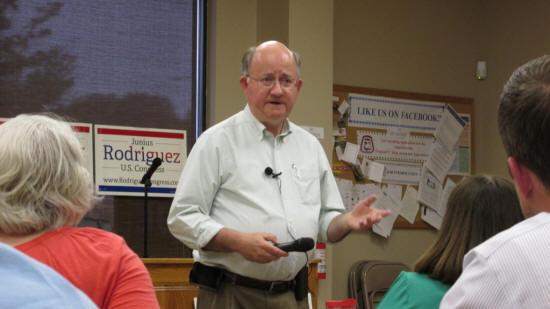|
U.S. IL-18th District Democratic
nominee Rodriguez Junius Rodriguez holds Town Hall in Lincoln Union
Hall
 Send a link to a friend
Send a link to a friend
 [May 18, 2018] [May 18, 2018]
LINCOLN
Junius Rodriguez, the
Democratic nominee for U.S. Representative in IL-18, held the fourth
in a series of eleven “town hall” events across the congressional
district on Tuesday night. Prior to the event, Rodriguez had
described this as “an opportunity to rejuvenate civic democracy by
bringing public discussion of issues and policies back to our local
communities.” Rodriguez, a professor of history at Eureka College,
considers himself to be a moderate along the political spectrum.
Questions were not pre-screened, and the public was invited to ask
questions and hold a discussion with the candidate. Twenty people
met in the Lincoln 1050 Union Hall to hear what Rodriguez had to say
on several issues. Rodriguez also asked audience members what some
of their greatest concerns were, and what they want him to address
in Congress. The event was also recorded and broadcast on Facebook.

The first topic Rodriguez was asked about concerned economic
opportunity, especially for the younger generations in the district.
Rodriguez said that he knows there is a real problem with youth
retention in this district, which is causing further economic
problems as younger people leave, and is splitting families apart.
Rodriguez said that from his perspective, one of the biggest
economic issues today is student debt. Younger people take on a
large amount of debt trying to get an education. Rodriguez said it’s
not just younger people, either, as parents often take on debt to
help send their children to school.
Rodriguez said he would like to see the creation of more forgiveness
programs for student debt, such as the possibility of more volunteer
service programs. These programs would allow for graduates to
volunteer time in some sort of public service to help remove some of
the financial burden.
For economic problems, Rodriguez said that citizens can stay
involved by making sure local governing bodies are populated with
representatives who want to improve local economies. Rodriguez said
that this sounds obvious, but he has met with officials before who
have no interest in economic programs. Rodriguez said that state and
federal officials should be willing and able to assist with such
programs, but they should not be a sole source of support.
Related to economic issues, Rodriguez also addressed the topic of a
higher living wage. According to Rodriguez, the last time the
federal minimum wage was sufficiently matched to the cost of living
was in the 1970’s. Rodriguez stated that there should be an increase
to the federal minimum wage, which would need to be around $10.20 as
a universal minimum.
Rodriguez also said that states and municipalities should have the
ability to set higher minimums. This is because even a universal
wage will not spend the same everywhere in the country. “Even if the
minimum wage was $15, that still wouldn’t do much in New York,” said
Rodriguez.
On the related topic of jobs, Rodriguez said we have to think of the
future, and what industries will be looking for employees. Rodriguez
talked about green energy, such as solar and wind farms. These
industries could provide infrastructure jobs. “Why can’t we be the
ones to build these components instead of importing them?” asked
Rodriguez.

Rodriguez also pointed to the medical cannabis industry. Currently,
there are two growing facilities in the district. Rodriguez said he
had the opportunity to visit one last year, and that the plant was a
multi-million dollar investment that lead to a lot of local jobs
being created.
During this part of the meeting, a man in the crowd asked about
recreational marijuana. Rodriguez said that while he supports such
an issue, he thinks the legalization of such a substance should be
an issue decided by individual states, not by the federal
government.
Another industry Rodriguez supports is that of social workers.
Rodriguez said that looking ahead, he thinks we will need many more
social workers, especially as we deal with the side effects of
opioid abuse.
Rodriguez also touched on an idea that other countries have
experimented with; a paid living income for citizens. Rodriguez did
not mention anything further on the idea, but he did say it was
something he has thought about that could also help the economy.
Rodriguez spoke several times during the night on anticipating for
the future. He said that we often think of the past when we think of
how to govern, and he thinks about the era after World War II, a
time some refer to as “the greatest generation.” When he thinks of
that time, he thinks about the economic burden of paying for the
war. Rodriguez said that if you measure the debt by individual GDP
(and not just as a total), the national debt we faced then was
actually worse than it is now.
“We made investments in science,” said Rodriguez, who thinks that
technological advancement will help us to ease that debt as it did
before. Rodriguez also pointed to the higher marginal tax rates
during that time. “There were still a lot of economic problems, but
there was certainly more prosperity than today,” said Rodriguez.
Rodriguez also echoed thoughts from the audience on strong labor
unions, and he added that when the nation was more invested in
science, we also had stronger unions, which helped the middle class
to rise.
Rodriguez also spoke on his views on gun laws. Rodriguez said he
thinks the loudest voices in the debates over gun violence are too
extreme, and he believes we need common sense firearm regulations.
[to top of second column] |


Rodriguez said that each amendment in the Constitution comes with “an asterisk.
You have freedom of speech, but you can’t yell fire in a movie theater.” He said
that should include the Second Amendment. That amendment allows for the right to
bear arms, although Rodriguez also specified that there are still certain
weapons, such as machine guns, that cannot be owned privately.
Rodriguez said he grew up in an area where hunting is a common activity, and
most hunters he has spoken to would not feel limited in any way if the
government enacted certain restrictions on firearms, such as restricting the
purchase of bump stocks, extending waiting periods, or raising the age
requirement to purchase a gun. “Even hunters want a middle ground,” said
Rodriguez.
Rodriguez pointed to the difficulty in passing any kind of regulation, which is
that any rules would have to “pass muster in the courts.” Any federal regulation
would likely head to the Supreme Court, which operates under rulings such as the
Heller ruling in 2008. The Heller ruling is known for the resulting
reinterpretation of the Second Amendment that emphasizes the individual right to
possess a firearm, which Rodriguez sees as disconnected from the rest of the
amendment.
Additionally, more recent rulings have retroactively applied the protection of
the amendment to weaponry developed after the Constitution was written.
Together, these rulings would make it very difficult for any new legislation to
hold up in court. Rodriguez also added that Supreme Court justices have been
known to change their minds on certain issues over time, so perhaps this is an
area to keep looking to the future.
As for Illinois, Rodriguez said that a lot of Illinois’ gun violence stems from
surrounding states with looser gun laws. He said that if states individually
pass stricter laws, that perhaps it will help to put political pressure on other
states.

Another topic Rodriguez was asked about is healthcare. Several people in the
room voiced their concerns over the Affordable Care Act, and the modifications
that have been made to it in recent months, which have weakened it even further.
Rodriguez said that in his opinion, the ultimate solution is a single-payer
system. Such a radical change is not going to happen immediately, according to
Rodriguez, but he does think it is something that could happen over the next
several years. Rodriguez considers the ACA to be an imperfect solution that
failed to adequately take on the pharmaceutical and health insurance industries.
For now, Rodriguez said we need to work in the margins, and he supports an
option to buy into Medicare at age fifty-five, as well as a fully-funded CHIP
system for children in poverty. “There are a lot of people in these categories
in this district,” said Rodriguez. Rodriguez said a lot of these people have run
into economic trouble, despite our recovery since the recession in 2008.
“It was a very uneven recovery,” said Rodriguez.
Rodriguez was also asked about his feelings on the Electoral College, the
necessity of which has been debated since the last presidential election, in
which the popular candidate lost in favor of the Electoral College decision.
Rodriguez said he knows there are states that have regulations concerning
Electoral College decisions. Currently, twenty-nine states and the District of
Columbia have legal control over the electors, meaning those electors have to
vote for the popular candidate. However, the remaining states have no such laws,
meaning those electors can vote for any candidate, regardless of the popular
choice.
Rodriguez said he wants to see reform on voting laws like this, but that such a
task is likely “impossible” at a federal level. Several people in the crowd
disagreed with that. One woman said the idea that anything is impossible has led
to too many issues for the Democratic Party already, and that the Party needs to
“stand for something and for the people.”
Rodriguez said he knows he is facing an “uphill battle” in this district, which
has voted heavily Republican over the last century. The incumbent, Darin LaHood,
has more financial backing, and is supported by people who know the LaHood name.
However, Rodriguez said he is also optimistic. He said that he recently received
campaign contributions from an unexpected source; farmers. Typically, farmers in
the district vote for Republican candidates. A woman in the audience suggested
that this is because of economic uncertainty farmers are facing this year, and
they feel that LaHood is not listening to their concerns.

Rodriguez said the plan is to hold a second series of town hall events across
the district in August, and third after the election if he wins the seat.
Rodriguez said that as a representative, he would hold at least four weeks’
worth of town hall meetings every year during his term, if not more. He plans to
serve six years and step down. “This isn’t something I want to keep doing in my
seventies,” said Rodriguez. “I think there needs to be a willingness to step
aside.”
Rodriguez said that he is not sure if Illinois will continue to be part of the
“Blue Wave” that other districts in the country are witnessing at elections.
“But there is something in the air this time,” said Rodriguez.
[Derek Hurley] |